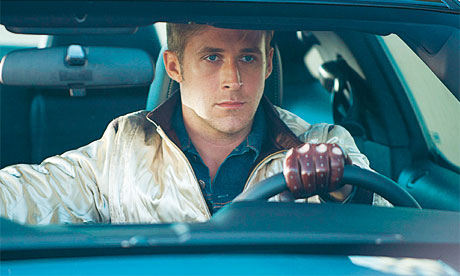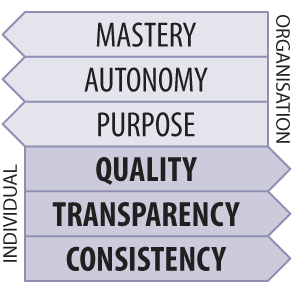
Drive – Turning Pink
Much has been made in the last couple of years, at least in the circles of conversation that I seem to be part of (whilst contemplating the rate at which ice melts in cider) of Dan Pink’s great book – Drive.
If you haven’t read it, head over to this great, animated accompaniment to a talk that Dan gave on the book. If you can’t be bothered with even that, you need some motivation.
Don’t worry though, as only a blog can do, I’ll boil it down even further for you. Pink argues (really well) in Drive, that the assumptions we have made for so long about the things that motivate us to do highly skilled work, things reflected in rewards such as pay increases at work etc., are wrong. For today’s increasingly sophisticated work, the traditional and simple tools of reward and punishment don’t work. There are (according to Pink) three main emotional pillars on which real, intrinsic motivation is built;
Mastery – The belief that one is striving to improve a craft
Autonomy – The feeling that one’s destiny and decisions are one’s own
Purpose – The understanding that one is contributing to something worthwhile
The message of course, is that if an organisation hopes to truly capture the imagination of it’s members and utilize that engagement to real effect, then it must provide an environment where all three are present and fostered.
Ok, so you’re going to talk about that with your mates, and you’re going to see how that stuff really does strike a chord with everyone, because “Brother, there just ain’t enough of this kind of love around where WE work”.
You’re right, your drunk brother’s right and I reckon Dan Pink is right too. That’s not what we’re here for today.
Let’s assume that everyone (even your boss) thinks that this stuff is bang on. What are the implications of trying to apply this thinking to the benefit of people or teams in a work environment? The beauty of Drive, is that it manages to capture feelings that we all identify with in those three succinct statements. When you read the book, it resonates because it you feel it “nails” what you had always found hard to articulate. Mastery! Autonomy! Purpose! That’s what I want!
As I’ve discussed here before though, I see the promise of such things as being just one half of a contract between an organisation and its members (employees), with responsibilities on both sides.
Drive (and books like it) have created an army of employees, who now expect the trust and freedom to work independently toward some challenging organisational goals, that will also satisfy them personally somehow. That’s great and it’s about time we felt like we should expect those things, but what should an organisation be able to expect in return?
I’m using the word organisation (not “business”) here deliberately, because for each of the Drive principles (assuming they’re in place), I think there is a corresponding reciprocation that everyone surrounding an individual has the right to expect. Not just the “boss”, but co-workers, business partners, customers, whoever. If you work with or even around me, you have the right to expect:
Quality
The understanding that what is produced will be the best work of a craftsperson.
I’m not talking about defect free. I’m not talking about a perfect finish. Just that the product of my work is fit for its purpose, and the very best work that I can do. If there are visible imperfections, it will be because that’s what we need, or because I simply couldn’t do better. But I won’t cut any corners or hide things that I know aren’t up to scratch. Count on it.
Transparency
The demonstration of a belief in the organisation’s trust.
I can get about this job all on my own. I’m a grown up. I’m a professional. Along the way, I’ll show you everything. The door is not open – there is NO DOOR. Feel free to ask me how it’s going. I’ll talk to you because I believe you have faith in me and want me to succeed. More than that, I’ll make my plans, progress and status visible to you, without you even needing to ask. I can and will let you into my world and my work. I want you with me.
Consistency
The acknowledgement that one is part of an organisation, defined by its being coordinated in the pursuit of a common goal.
My conduct will always be in line with our mission. The effort I make will all be directed at that. I’ll be regular in my work rate and timely in my delivery. I’m cool with some tracking of those things if they give us a better understanding of our momentum, and because I know that others need to synchronise their effort with mine sometimes. Those people can rely on me to be creative and exploratory in my thinking, but predictably professional and understanding of their needs.
Drive is a management book. It seeks to inspire managers to do better by the people they manage, the notion being that Autonomy, Mastery and Purpose are things that can be provided for (or not) by the organisation. If Drive is about what individuals get, these reciprocal ideas are about what individuals give. They’re not backed with research and they’re not complete, I just made this shit up . . . . . . but I believe in it.
My three pillars won’t be as popular for water cooler banter. Talk of revolution usually trumps talk of responsibility, but I feel it’s a conspicuously absent piece of nearly every conversation I’ve had about Drive. The idea isn’t missing from the book by the way. The whole premise is that people behave in these ways naturally under the right conditions. Nor is it isn’t missing from most people’s view of how they’d go about their professional lives (people want to give) – it’s just missing from front-bar rhetoric and I wonder if it’s for the lack of some buzz words.
Quality, Transparency, Consistency.
The more you believe in these things, the more you enact them, the more rewarding I believe your working life can be. It’s about Driving yourself.
It’s your shout.


+ There are no comments
Add yours